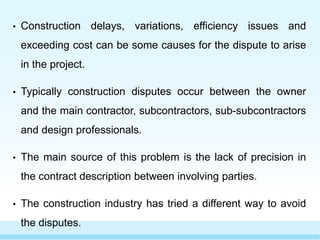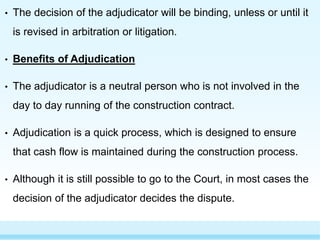- 1. Construction
Disputes
PREPARED BY
GAYATHRY SATHEESAN
- 2. Construction Disputes
• Construction disputes arise from environmental and
behavioral factors.
• There are many different causes of disputes in the
construction industry.
• Disputes waste money, therefore drain profits and destroy
the relationship and it takes energy away from projects.
- 3. • Construction delays, variations, efficiency issues and
exceeding cost can be some causes for the dispute to arise
in the project.
• Typically construction disputes occur between the owner
and the main contractor, subcontractors, sub-subcontractors
and design professionals.
• The main source of this problem is the lack of precision in
the contract description between involving parties.
• The construction industry has tried a different way to avoid
the disputes.
- 4. • Currently, construction industry uses Building Information
Modeling (BIM) or 3D modeling and it has significantly
minimized these kinds of disputes.
• The reasons for construction disputes are being a part of
construction life fall into four categories.
• Contract
• Finance
• Culture
• External Factors
- 5. Definition of Dispute
• Dispute is a misunderstanding between two parties, either
contractual or non- contractual.
• Dispute is unable to eliminate because the nature of the
construction is full risk.(Thomas 1995)
• Definition of the dispute may be circumscribed it may
inevitably involve resolution of other matters which may not
specifically have been raised into separate or discrete
disputes.
- 6. • The judicial development of the definition of dispute required
to give an adjudicator threshold jurisdiction has been
instrumental in encouraging the Parties to exchange views
and facts which support their case, but it can be a rather
blunt instrument for reducing dispute and far short of a pre-
adjudication protocol
• A dispute will not exist until a claim is asserted by one party
which is disputed by the other party.
- 7. Factors Affecting Construction
Disputes
1. Terms of the Contract
2. Technological Issues
3. Project Conditions
4. Parties Involved
5. Magnitude
6. Site Conditions
7. Degree of Bias
8. Third Party
9. Organizational Behavior
10. Culture
- 8. common causes of disputes
• Failure to properly administer the contract
• Poorly drafted or incomplete/unsubstantiated claims
• Employer/Contractor/Subcontractor failing to understand
and/or comply with its contractual obligation
• Errors and/or omissions in the contract document
• Incomplete design information or employer requirements.
- 9. Causes of Construction Dispute by
Clients
• Deficient management supervision
• Lowest price mentality in engagement of contractor
• Poor communication
• Discrepancies in contract documents
• Failure to appoint project manager
• Failure to respond in time
- 10. Causes of Construction Disputes by
Contractors
• Delay suspension of work
• Lack of understanding and agreement in contract
procurement
• Inadequate CPM scheduling and update requirement
• Failure to plan and execute the changes of works
• Reluctance to seek clarification
• Failure to understand and correctly bid or price the works
- 11. Causes of Construction Dispute by
the Consultants
• Failure to understand its responsibilities under the design
team contract
• Over design and understanding, the costs involved
• Incompleteness of drawing and specification
• Design and specification oversight and errors or omission
from specialists
• Variations due to design errors
• To request for information late information delivery and
cumbersome approach
- 12. Adjudication
• It is a process in which a neutral third party will give a decision
on a dispute.
• Construction and Regeneration Act 1996 states that parties to a
construction contract may refer their disputes to an adjudicator.
• Adjudication has become known as a ‘pay first, argue later’ way
for parties to resolve their disputes.
• A successful party to adjudication can apply to the Technology
and Construction Court to enforce an adjudicator’s decision.
- 13. • The decision of the adjudicator will be binding, unless or until it
is revised in arbitration or litigation.
• Benefits of Adjudication
• The adjudicator is a neutral person who is not involved in the
day to day running of the construction contract.
• Adjudication is a quick process, which is designed to ensure
that cash flow is maintained during the construction process.
• Although it is still possible to go to the Court, in most cases the
decision of the adjudicator decides the dispute.
- 14. • Adjudication is less expensive than court proceedings.
• Disadvantages of adjudication
• The dispute needs to have been aired between the parties
before adjudication can be commenced.
• The adjudicator’s powers are limited.
• Court proceedings are still required to enforce the adjudicator’s
decision if the “losing” party does not pay.
- 15. Expert Determination
• It is often used to resolve issues or disputes of a
specialist nature, such as construction, and is one of
the most informal systems of dispute resolution.
• It is often used when there is a valuation dispute.
• If an expert is to be used to determine the dispute, the
parties will agree this by contract and will agree that
the expert determination will be binding.
- 16. Benefits of Expert Determination
• It is an economic way of finally resolving valuation disputes.
• It is less expensive and a quicker and a less formal method of
dispute resolution.
- 17. Disadvantages of Expert
Determination
• The use of experts is much less tied to legal processes and
therefore it is more difficult to challenge the decision of an
expert.
• An expert’s report cannot generally be enforced without further
court or arbitration proceedings.
- 18. Litigation
• Whilst there are many methods of ADR, court proceedings are
still one of the most common forms of resolving disputes within
the construction industry.
• The Technology and Construction Court (TCC) is a specialist
court which deals with technology and construction disputes and
is governed not only by the Civil Procedure Rules but also by
the Technology and Construction Court Guide.
• A specialist TCC judge will deal with cases in the TCC.
- 19. Advantages of Litigation
• The claim process will be managed by a judge throughout.
• Complex issues can be dealt with.
• The parties will obtain a binding and enforceable decision.
- 20. Disadvantages of Litigation
• Only claims which are over the value of £250,000 can be dealt
with at the TCC.
• Any claims below this sum will be dealt with at the County
Court.
• It is often a slow process and it is most expensive .
• The proceedings will be in public and are therefore not
confidential, except in certain very limited circumstances.
• Mediation
- 21. Mediation
• Mediation is commonly used within the construction industry to
resolve disputes.
• The Technology and Construction Court Guide provides
guidance on the conduct of litigation within the construction
industry and states that the court should encourage parties to
use alternative dispute resolution (ADR), which in most cases,
will be mediation.
- 22. • The Pre-Action Protocol for Construction and Engineering
Disputes requires parties in dispute to meet, at least once
before litigation commences, to discuss whether some form of
ADR, such as mediation, would be a more appropriate means to
resolve the dispute.
- 23. Benefits of Mediation
• The mediator will be an independent person, who will not make
a decision, judge or advise, but will facilitate discussions
between the parties, with the aim of resolving the dispute.
• Mediators are generally highly experienced in the area of the
dispute, and may even by TCC judges.
• It can help maintain a business relationship.
• It is relatively quick, with mediations usually lasting 1-2 days.
- 24. • It is usually considerably less costly than litigation.
• Everything that happens in a mediation is confidential.
• A mediator will encourage the parties to find a solution to the
dispute which will suit both the parties’ needs.
- 25. Disadvantages of Mediation
• In some cases there may be a concern that, during mediation,
parties may disclose an important aspect of their argument or
commercial position, which (despite the confidential nature of
mediation) could benefit the other party if the matter went to
trial.
• If the parties do not come to an agreement, the dispute will
remain unresolved and the cost of mediation will have been
wasted.
- 26. Arbitration
• It is another alternative to litigation and is a process in
which the parties will agree to refer the dispute to a third
party, the arbitrator.
• Disputes are resolved on the basis of material facts,
documents and relevant principles of law.
• Arbitration is often used in the context of international
construction disputes, but can equally be used for pure
domestic disputes.
- 27. Benefits of Arbitration
• Like mediation, arbitration is a confidential process.
• Parties can agree on an arbitrator who has relevant
experience in the matter.
• Compared to court proceedings, it is a relatively quick
process.
• It is highly flexible compared to court proceedings.
- 28. Disadvantages of Arbitration
• It is the parties’ responsibility to bear the costs of both the
arbitrator and the venue where the arbitration is to take
place.
• There are limited powers of compulsion or sanction
available to the arbitrator if one party fails to comply with the
directions set by the arbitrator.
• There are limited appeal rights available during arbitration
and Costs can be similar to litigation at court.
- 29. Thank You




























